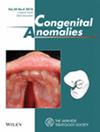新生儿腹内脐静脉曲张多指畸形
IF 1.3
4区 医学
Q3 PEDIATRICS
引用次数: 0
摘要
本文章由计算机程序翻译,如有差异,请以英文原文为准。
Intra-abdominal umbilical vein varix in a neonate with polysyndactyly
An umbilical vein varix (UVV) was first recognized as a malformation by Konstantinova in autopsies of aborted fetuses, stillborn infants, and newborn deaths. This malformation is a focal dilatation most commonly located along the intra-abdominal portion (IUVV) of the umbilical vein. Its etiology is unknown. The incidence is approximately 0.4–1.1 cases/1000 births. The rarity of cases has limited development of a firm consensus on anteand postnatal management. However, accepted diagnostic prenatal ultrasound criteria include venous dilatation of >9 mm, or venous dilatation diameter exceeding 50% of the adjacent non-dilated umbilical vein. While fetal and
求助全文
通过发布文献求助,成功后即可免费获取论文全文。
去求助
来源期刊

Congenital Anomalies
PEDIATRICS-
自引率
0.00%
发文量
49
审稿时长
>12 weeks
期刊介绍:
Congenital Anomalies is the official English language journal of the Japanese Teratology Society, and publishes original articles in laboratory as well as clinical research in all areas of abnormal development and related fields, from all over the world. Although contributions by members of the teratology societies affiliated with The International Federation of Teratology Societies are given priority, contributions from non-members are welcomed.
 求助内容:
求助内容: 应助结果提醒方式:
应助结果提醒方式:


